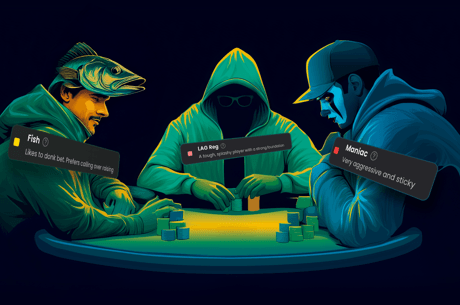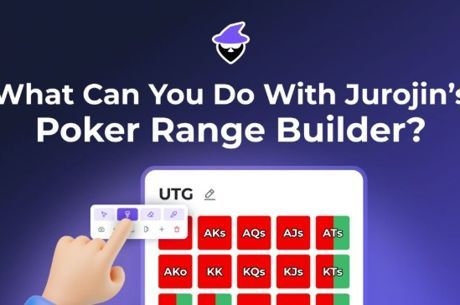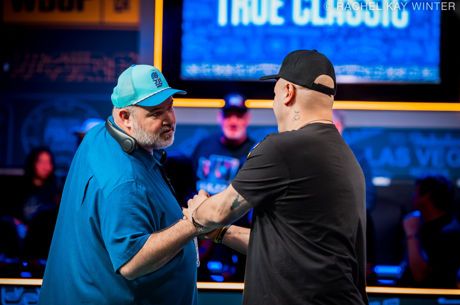A Structured Approach to Hand Reading: Talking “The Template” with Hunter Cichy

Hunter Cichy, a Florida-based poker pro and coach, made an important discovery early in his career: if he didn’t pay attention to exact hand ranges preflop, then everything seemed to fall apart later in the hand — especially in deep live cash games.
In an effort to structure his thoughts and pay attention, Cichy developed a list of questions that he asks himself during every hand. We caught up with Cichy, the founder of the training site Check Shove Poker, to discuss the approach that he calls “The Template.”
PokerNews: What’s “The Template”?
Hunter Cichy: After finishing an AAS in Paramedic Technology — most of which was at a Level I trauma center — I’m used to things like protocols, guidelines, quality assurance programs, and decentralized command concepts. It’s easy to get distracted by a broken leg while someone is going into cardiac or respiratory arrest. You have to prioritize.
Poker pried me away from a health care career, but I still learned a lot of valuable lessons. In a nutshell, “The Template” is an algorithm that forces me to consciously consider pertinent factors involved in every action at the table. I can adapt within that algorithm, but the same concepts run through my head over and over. Structuring my thought process prevents me from distraction.
Let’s get concrete. When it’s your turn to act, what questions are running through your head?
If the action folds to me preflop...
What is the pre-flop dynamic?
- Where am I in relation to the button?
- What are the effective stacks?
Based on these factors, what is the optimal range of hands for me to open with?
- Do I have any incentive to change my opening range?
- Do I have any incentive to change my opening size?
- What will I do if I get three-bet?
If the action limps to me preflop…
What is the preflop dynamic?
- Where am I in relation to the button?
- What are the effective stacks?
- How many people limped?
Who are the limpers?
- Do they tend to limp-call or limp-fold?
- Are their ranges elastic or inelastic?
- Do they intend to limp-raise?
Based on these factors, what is the optimal range of hands for me to isolate with?
- Do I have any incentive to change my isolation range?
- Do I have any incentive to change my isolation size?
- What will I do if I get three-bet?
- What will I do if I get limp-raised?
- Do I have any incentive to over-limp?
Postflop with the preflop initiative…
Who has a range advantage on the flop?
- Who has the most equity on the flop?
- Whose range is uncapped?
- Whose range has the most pairs?
How many combinations of value hands do I have in my range?
- How many bluffs can my value range support?
- Is Villain folding enough for my bluffs to be profitable?
- Can I defend against check-raises?
- Is my checking range well-protected?
(Ed. note: For additional postflop and advanced considerations, watch Hunter’s three-part video series.)
What do you mean by a “well-protected” checking range?
Many players open preflop, get called by the big blind, and check behind on the flop with weak showdown value hands. They never check with stronger hands to protect the weaker ones. As a result, they are very easy to exploit on turns and rivers. For a basic intro to the concepts of balance and frequencies, see Poker’s 1% by Ed Miller.
You mention the importance of thinking in terms of ranges and range advantages. How does your thought process change when you’re in a heads-up versus a multi-way pot?
Heads-up pots are much more dynamic than multi-way pots. There’s a lot more room to maneuver and adapt to exploit Villain to the max. Multi-way pots require a lot more honesty — and there’s nothing wrong with that.
A basic understanding of game theory shows that there are very few situations where three or more people should be seeing a flop. As a result, I assume that someone has already made a mistake in multi-way pots and I seek to extract as much value as possible from weak opponents.
How has game theory improved your approach to live poker?
It doesn’t play much of a role when I have reads on my opponents; however, game theory has drastically improved my performance in informationally-deprived environments. I constantly run into unknown players who use chaotic, fundamentally unsound tactics. With little to no information on my opponents, it’s important for me to have a robust strategy that continuously generates EV.
What specific resources or exercises would you recommend for players wanting to develop a framework for thinking through hands?
It’s important to understand that most poker training sites have a financial incentive to incrementally improve your performance so you continue to pay their subscription fees. That being said, a few websites are worth checking out. In my opinion, Red Chip Poker is the best small-stakes training site, Crush Live Poker is the best live cash game training site, and Run It Once is by far the best high-stakes training site on the internet.
Software such as PokerCruncher, Flopzilla, CardRunners EV, GTO Range Builder, PioSolver, ICM Trainer, SnapShove, PokerJuice, and PokerSnowie can also be useful, but only if you have someone to guide you through the process.
In the last year or so, I’ve learned that my poker students have a universal appreciation for “The Template,” which is much more efficient than haphazardly considering some live read like, “Jeff crinkled his nose, shuffled chips with his left hand, and bet four greens.” The development of my students’ postflop skills is exponentially faster as a result of the system I’ve created.
To learn more about Hunter Cichy, “The Template,” and his coaching program, visit Check Shove Poker.
Want to stay atop all the latest in the poker world? If so, make sure to get PokerNews updates on your social media outlets. Follow us on Twitter and find us on both Facebook and Google+!










